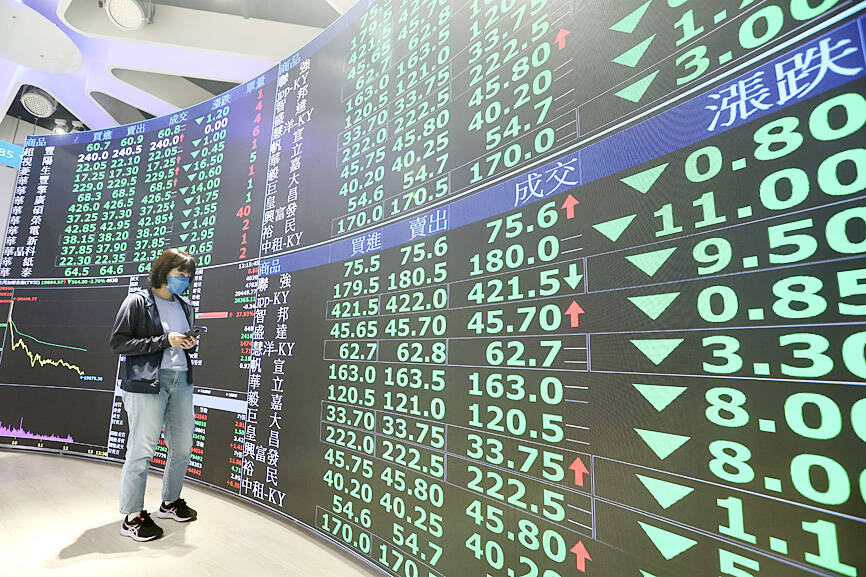The TAIEX yesterday tumbled 2.68 percent, or 547.81 points, to 19,901.96, as escalating military conflict in the Middle East unnerved investors and triggered panic sell-offs across the board, analysts said.
It was the first time the TAIEX dipped below 20,000 points since March 20.
The slump came on the heels of successive retreats on Wall Street, as global bourses assimilated Iran’s attack on Israel, which could usher in a new phase of tension, uncertainty and confrontation.

Photo: CNA
“The decline is the steepest since October 2022 and pushed the main board below the 20,000-point mark,” Taishin Investment Trust Co (台新投信) said.
Geopolitical tensions aside, fund outflows by foreign portfolio managers and domestic proprietary traders also played a part in the drab showing, Taiwan Stock Exchange data showed.
Turnover was NT$534.908 billion (US$16.46 billion) after foreign players cut their holdings by NT$38.8 billion, while proprietary traders lowered their positions by NT$20.08 billion, the local bourse said.
Mutual funds raised their stakes by NT$1.6 billion.
The Securities and Futures Bureau said that Taiwan’s economic fundamentals remain healthy and it is better to approach investment from a long-term perspective.
The Financial Supervisory Commission would take any necessary measures to respond to changes in international politics that affect the global economy, officials said.
More than 80 percent of shares fell, with heavyweight technology shares hit the hardest.
Shares of MediaTek Inc (聯發科), the world’s biggest 5G smartphone chip designer, plunged 4.95 percent to NT$1,055, while those of iPhone assembler Hon Hai Precision Industry Co (鴻海精密) fell 3.42 percent to NT$141 in the wake of poor iPhone sales.
Shares of Taiwan Semiconductor Manufacturing Co (TSMC, 台積電) fared better than the TAIEX given their 2.23 percent fall to NT$788, the local bourse said.
TSMC is due to unveil its first-quarter earnings tomorrow, and shed light on its business outlook and industry trends.
While mindful of geopolitical twists, investors would pay close attention to TSMC’s financial results and business guidance, Nomura Asset Management Taiwan Ltd (野村投信) said.
TSMC is responsible for supplying advanced chips used in the latest smartphones and artificial intelligence tools.
Popular exchange-traded funds (ETFs) also ranked high on the selling lists of foreign portfolio managers and proprietary traders.
They slashed positions in ETFs featuring high cash dividends with the stock codes 00940, 00929, 00919, 0056 and 00878 in favor of the US dollar.
The New Taiwan dollar yesterday shed another NT$0.112 versus the greenback to close at NT$32.490 in Taipei trading, the central bank’s Web site showed.
The NT dollar has weakened 1.6 percent so far this month, as hotter than expected US inflation data could prompt the US Federal Reserve to postpone interest rate cuts.

Intel Corp chief executive officer Lip-Bu Tan (陳立武) is expected to meet with Taiwanese suppliers next month in conjunction with the opening of the Computex Taipei trade show, supply chain sources said on Monday. The visit, the first for Tan to Taiwan since assuming his new post last month, would be aimed at enhancing Intel’s ties with suppliers in Taiwan as he attempts to help turn around the struggling US chipmaker, the sources said. Tan is to hold a banquet to celebrate Intel’s 40-year presence in Taiwan before Computex opens on May 20 and invite dozens of Taiwanese suppliers to exchange views

Application-specific integrated circuit designer Faraday Technology Corp (智原) yesterday said that although revenue this quarter would decline 30 percent from last quarter, it retained its full-year forecast of revenue growth of 100 percent. The company attributed the quarterly drop to a slowdown in customers’ production of chips using Faraday’s advanced packaging technology. The company is still confident about its revenue growth this year, given its strong “design-win” — or the projects it won to help customers design their chips, Faraday president Steve Wang (王國雍) told an online earnings conference. “The design-win this year is better than we expected. We believe we will win

Chizuko Kimura has become the first female sushi chef in the world to win a Michelin star, fulfilling a promise she made to her dying husband to continue his legacy. The 54-year-old Japanese chef regained the Michelin star her late husband, Shunei Kimura, won three years ago for their Sushi Shunei restaurant in Paris. For Shunei Kimura, the star was a dream come true. However, the joy was short-lived. He died from cancer just three months later in June 2022. He was 65. The following year, the restaurant in the heart of Montmartre lost its star rating. Chizuko Kimura insisted that the new star is still down

While China’s leaders use their economic and political might to fight US President Donald Trump’s trade war “to the end,” its army of social media soldiers are embarking on a more humorous campaign online. Trump’s tariff blitz has seen Washington and Beijing impose eye-watering duties on imports from the other, fanning a standoff between the economic superpowers that has sparked global recession fears and sent markets into a tailspin. Trump says his policy is a response to years of being “ripped off” by other countries and aims to bring manufacturing to the US, forcing companies to employ US workers. However, China’s online warriors